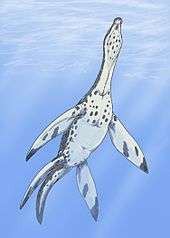Meyerasaurus
| Meyerasaurus Temporal range: Early Jurassic, 183–180 Ma | |
|---|---|
 | |
| The holotype in the State Museum of Natural History Stuttgart | |
| Scientific classification | |
| Kingdom: | Animalia |
| Phylum: | Chordata |
| Class: | Reptilia |
| Superorder: | †Sauropterygia |
| Order: | †Plesiosauria |
| Clade: | †Neoplesiosauria |
| Family: | †Rhomaleosauridae |
| Genus: | †Meyerasaurus Smith & Vincent, 2010 |
| Species: | † M. victor |
| Binomial name | |
| Meyerasaurus victor (Fraas, 1910 [originally Plesiosaurus]) | |
| Synonyms | |
|
Plesiosaurus victor Fraas, 1910 | |
Meyerasaurus is an extinct genus of rhomaleosaurid known from Holzmaden, Baden-Württemberg of southeastern Germany.[1]
Description

Meyerasaurus is known from the holotype SMNS 12478, articulated and complete skeleton which preserved the skull, exposed in ventral view. The skull has a length of 37 cm (15 in), and the animal is about 3.35 m (11.0 ft) in length. It was collected from the Harpoceras elegantulum-falciferum ammonoid subzones, Harpoceras falcifer zone, of the famous Posidonien-Schiefer lagerstätte (Posidonia Shale), dating to the early Toarcian stage of the Early Jurassic, about 183-180 million years ago.[1]
Etymology
Meyerasaurus was first named by Adam S. Smith and Peggy Vincent in 2010 and the type species is Meyerasaurus victor. It was originally classified as a species of Plesiosaurus, later as the second named species of Thaumatosaurus (defunct name, meaning "wonder reptile") and ultimately as a species of Eurycleidus or Rhomaleosaurus. The generic name honors the German palaeontologist Hermann von Meyer for proposing the generic name Thaumatosaurus.[1]
Classification

The cladogram below shows Meyerasaurus phylogenetic position among other plesiosaurs, following Benson et al. (2012).[2]
| Plesiosauria |
| ||||||||||||||||||||||||||||||||||||||||||||||||||||||||||||||||||||||||
| |
See also
References
- 1 2 3 Adam S. Smith and Peggy Vincent (2010). "A new genus of pliosaur (Reptilia: Sauropterygia) from the Lower Jurassic of Holzmaden, Germany" (PDF). Palaeontology 53 (5): 1049–1063. doi:10.1111/j.1475-4983.2010.00975.x.
- ↑ Roger B. J. Benson, Mark Evans and Patrick S. Druckenmiller (2012). "High Diversity, Low Disparity and Small Body Size in Plesiosaurs (Reptilia, Sauropterygia) from the Triassic–Jurassic Boundary". PLoS ONE 7 (3): e31838. doi:10.1371/journal.pone.0031838. PMC 3306369. PMID 22438869.
| ||||||||||||||||||||||||||||||||||||||||||||||||||||||||||||||||||||||||||||||||||||||||||||||||||||||||